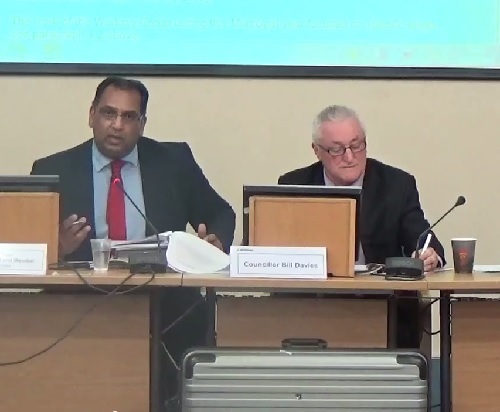Wirral Council U-turns on refusal of FOI request for values and culture presentation
Over a year ago (3rd July 2014) I made a Freedom of Information Act request to Wirral Council using the excellent whatdotheyknow.com website for an email (and an attached Powerpoint presentation to the email) sent by Surjit Tour on Thursday 24th April 2014 with the subject of L&MS – Values and Culture Presentation. L&MS stands for Legal and Member Services (Member meaning councillor in local government jargon).
On the last day of July (31st July 2014) I got a reply. Mr Tour had considered the FOI request and refused it. His response referred to section 36 (prejudice to effective conduct of public affairs) of the Freedom of Information 2000. For those familiar with this part of the Freedom of Information Act this is one of the parts that is subject to a public interest test.

Mr. Tour (who made the first decision on this request) claimed in refusing the request that releasing his email (and attachment) would:
or
(c) otherwise prejudice the effective conduct of public affairs.
Further detail was given about why this request was refused “The information requested was used as an integral part of a management meeting where a corporative initiative was openly discussed and debated” and “The Council has held/is holding a series of management meetings where there must be a safe space to share corporate initiatives and openly discuss and debate any issues arising in these meetings. It is also my reasonable opinion that if the requested information were to be disclosed, it would likely have a “chilling effect” that would inhibit the free and frank discussion and debate on matters of importance to the Council and its workforce. Any disclosure is likely to undermine the ability of officers to express themselves in a frank and open manner.”
It was further claimed that “disclosure would restrict the free and frank exchanges of views”, “disclosure would stifle debate at such meetings and could lead to poorer decision making” and “disclosure would have a potential detrimental effect on future management meetings” although “transparency in disclosure of the content of the management meeting” was given as a factor in favour of disclosure. Also stated in the response was “I consider it is crucial that officers are able to engage in discussion and exchange views in an open and frank manner.”
At the time I got this response I didn’t request an internal review. I’d requested internal reviews before when Mr. Tour had claimed section 36 applied to the information requested. You can see an example of a request here for minutes of the Standards Working Group meeting of the 17th December 2013 where Mr. Tour refuses it based on section 36 and at internal review the former Chief Executive of Wirral Council Graham Burgess agrees with Mr. Tour.
At the time I probably thought it pointless to request an internal review as I thought the Chief Executive would just agree with Mr. Tour.
In February 2015 councillors at Wirral Council appointed a new Chief Executive Eric Robinson. So I submitted an internal review request on the 25th March 2015.
The new Chief Executive Eric Robinson on the 21st April 2015 agreed with Mr. Tour.
His responses were as follows, first to my point about whether it was a conflict of interest for Mr. Tour to decide on whether to release his own email:
In response to the point that the email and attachment was sent before the meeting, didn’t detail what was debated at the meeting therefore how could it “stifle debate at such meetings”?
Finally responding to my point “well surely if Wirral Council is “open and transparent” then being “open and transparent” here about a very important aspect of the organisation (values and culture) would demonstrate to the public that Wirral Council has changed?” he replied:
He included various links to the Council’s website to the Corporate Plan, a page on the Transparency Code and a page on the Freedom of Information Act 2000 & the Data Protection 1998.
Finally he stated:
and
So on the 19th May 2015 I appealed this decision to the Information Commissioner’s Office. On the 11th August 2015 Wirral Council supplied the attached Powerpoint presentation but stated that the email had since been deleted.
Shortly after I received an email from the Information Commissioner’s Office stating that the case was now closed, although I have emailed them this morning asking them to clear up that the Chief Executive at internal review stated “The contents of the attachments still remain current and topical to the Council.” which would suggest more than one attachment to the email, yet only one attachment was supplied.
So what is in this eighteen slide Powerpoint presentation that Mr. Tour and Mr. Robinson seemed so keen to prevent being released?
Ironically (considering what I’ve just written above) slide 10 on integrity states
However that point aside, the slides are about “organisational vision”, “values” and “culture”.
Slide 7 states that Wirral Council’s vision is:
Slide 9 introduces Wirral Council’s values which are:
Slides 10 to 13 define each of these values.
“Integrity
- We treat everyone with respect
- We are accountable and take responsibility for our actions & decisions
- We communicate & are open and honest in what we do
Efficiency
- We seek innovative & creative solutions
- We work effectively together to make the most of our resources
- We proactively look for ways to improve
Confidence
- We fully use the skills, talents & assets of our partners, communities and organisation
- We take decisions and deliver
- We learn from & share knowledge and expertise with others
Ambition
- We deliver with energy and pace
- We are risk aware, not risk averse
- We have pride in our place and our people striving to be the best we can for Wirral”
The last slide refers to “support & change agents to be allocated”. If anyone would like to explain to me what a “support & change agent” is please leave a comment!
If you click on any of the buttons below, you’ll be doing me a favour by sharing this article with other people.

